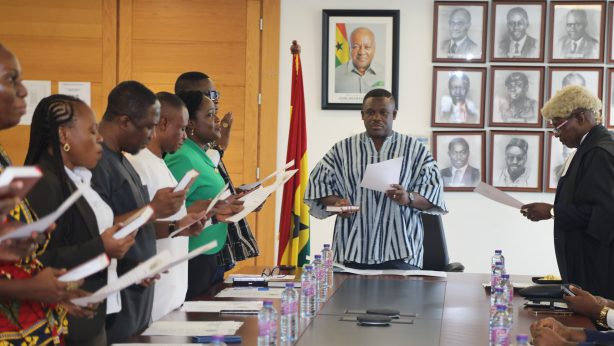GIFEC, ITU Empower 30 Women with Digital Skills

The Acting Deputy Administrator of the Ghana Investment Fund for Electronic Communications (GIFEC), Honourable Abdul-Aziz Mohammed, has reiterated GIFEC’s commitment to advancing digital inclusion through strategic partnerships and investments in underserved communities.
Speaking at the closing ceremony of a two-week digital skills training programme for 30 women at the Sagnarigu Community Information Centre in the Northern Region, Hon. Abdul-Aziz expressed appreciation to the International Telecommunication Union (ITU) for fully funding the training programme. He also acknowledged the support of implementing partners, HP, Cisco, and NORAD for their continued contribution to Ghana’s digital development agenda.
“We are extremely grateful to the ITU for funding this impactful initiative and to all our partners for their unwavering support. This programme is not just about ICT training, it is about building a digitally empowered society, starting with women educators who can train and inspire the next generation,” he said.
Hon. Abdul-Aziz Mohammed announced GIFEC’s plans to scale up its monitoring of ongoing projects, with a renewed focus on revamping several Community Information Centres across the country. He added that the Northern Innovation Centre, located in Tamale, will serve as the official launchpad for the One Million Coders programme. In addition, existing Community Information Centres (CICs) will be renovated and equipped to serve as supporting training centres, bringing digital literacy and coding skills closer to local communities.
“These centres would play a pivotal role in helping Ghana meet its digital skills development goals by ensuring that every Ghanaian, regardless of location, has access to relevant ICT infrastructure and training,” Hon. Abdul-Aziz added.
He also advised the participants to make the most of the laptops that had been presented to them. “These laptops are not just gifts; they are tools of transformation. Use them well, protect them, and put them to work in ways that impact your schools and your communities,” Hon. Abdul-Aziz advised.
The Director of Operations, Alhaji Yahaya Zakaria Osman, congratulated the participants and encouraged them to apply what they had learned to benefit their students, fellow teachers, and wider communities, adding that knowledge is only powerful when it is shared. “You now have the responsibility to extend this knowledge beyond yourselves. Use it to make an impact in your classrooms, in your circles, and in your communities,” he advised.

The Director of Corporate Affairs at GIFEC, Ms. Francisca M. Adjei, delivering her remarks challenged the participants to return to their schools not just as teachers, but as changemakers. She advised them to make use of the tools they have received to start something in their schools by being that woman who dares to lead.
Speaking on behalf of the participants, Madam Ojo Emelia Habiba expressed deep gratitude to GIFEC and its partners for the opportunity. She highlighted how the training had empowered them with both knowledge and confidence to make meaningful change.
“This training has truly been a life-changing experience for all of us. We are grateful for the investment made in us, and we pledge to use these skills to train our students, mentor other teachers, and contribute to digital inclusion efforts in our schools and communities,” she said.
The training programme, which targeted 30 women teachers from the Northern, Savannah, and North East Regions, was designed to equip them with practical digital literacy and basic ICT skills. Participants are expected to serve as peer trainers and facilitators in their schools and communities, creating a ripple effect of knowledge sharing and digital empowerment.
All 30 participants were presented with certificates of participation, laptops, and souvenirs to support their roles as peer ICT trainers. The gesture not only marked the end of the training but also the beginning of a new chapter in their professional and personal development journeys.

The two-week programme forms part of GIFEC’s broader efforts to bridge the digital divide and promote inclusive development through capacity building, especially among women and youth in marginalised communities. The training programme is geared towards achieving Sustainable Development Goal (SDG) 5 which seeks to address gender equality and empower women through digital skills development.



